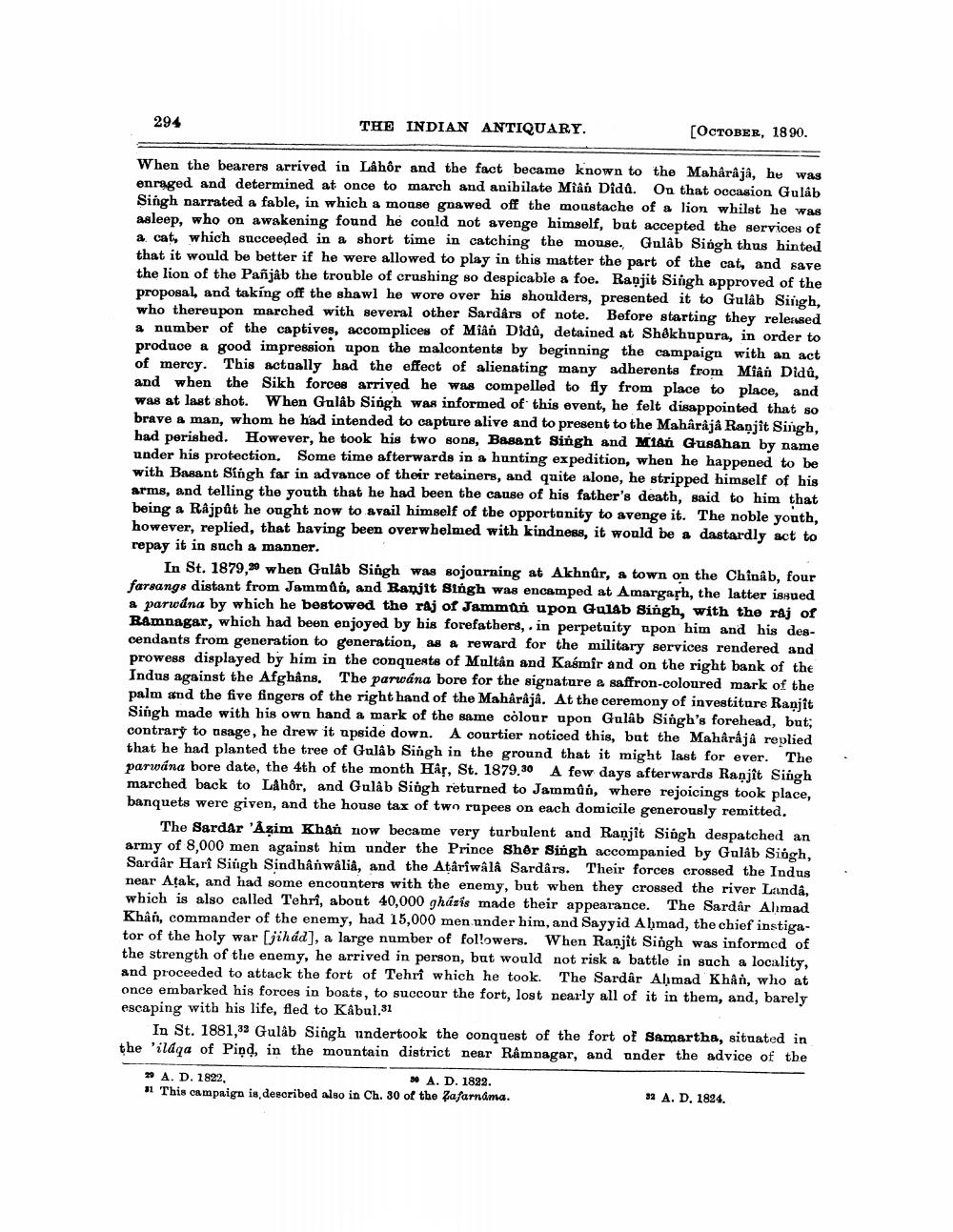________________
294
THE INDIAN ANTIQUARY.
[OCTOBER, 1890.
When the bearers arrived in Lahor and the fact became known to the Mahârâjâ, he was enraged and determined at once to march and anihilate Mîân Didů. On that occasion Guláb Singh narrated a fable, in which a mouse gnawed off the moustache of a lion whilst he was asleep, who on awakening found he could not avenge himself, but accepted the services of a. cat, which succeeded in a short time in catching the mouse. Gulab Siógh thus hinted that it would be better if he were allowed to play in this matter the part of the cat, and save the lion of the Pañjab the trouble of crushing so despicable a foe. Ranjit Singh approved of the proposal, and taking off the shawl he wore over his shoulders, presented it to Gulâb Singh, who thereupon marched with several other Sardars of note. Before starting they released a number of the captives, accomplices of Miâo Didů, detained at Shâkhupura, in order to produce a good impression upon the malcontents by beginning the campaign with an act of mercy. This actually had the effect of alienating many adherents from Mian Didů, and when the Sikh forces arrived he was compelled to fly from place to place, and was at last shot. When Gulab Singh was informed of this event, he felt disappointed that so brave a man, whom he had intended to capture alive and to present to the Mahârâjâ Ranjit Singh, had perished. However, he took his two sons, Basant Singh and Mia Gusahan by name under his protection. Some time afterwards in a hunting expedition, when he happened to be with Basant Singh far in advance of their retainers, and quite alone, he stripped himself of his arms, and telling the youth that he had been the cause of his father's death, said to him that being a Rajpût he onght now to avail himself of the opportunity to avenge it. The noble yonth, however, replied, that having been overwhelmed with kindness, it would be a dastardly act to repay it in such a manner.
In St. 1879,20 when Gulab Singh was sojourning at Akhnûr, a town on the Chinâb, four farsangs distant from Jamman, and Ranjit Singh was encamped at Amargarh, the latter issued a parwana by which he bestowed the raj of Jamman upon Gulab Singh, with the raj of Ramnagar, which had been enjoyed by his forefathers, . in perpetuity upon him and his descendants from generation to generation, as a reward for the military services rendered and prowess displayed by him in the conquests of Multan and Kasmir and on the right bank of the Indus against the Afghans. The parwana bore for the signature a saffron-coloured mark of the palm and the five fingers of the right hand of the Mahârâjâ. At the ceremony of investiture Ranjit Singh made with his own hand a mark of the same colour upon Gulab Singh's forehead, but; contrary to tsage, he drew it upside down. A courtier noticed this, but the Maharajâ replied that he had planted the tree of Gulab Singh in the ground that it might last for ever. The parwana bore date, the 4th of the month Hår, St. 1879.30 A few days afterwards Ranjit Singh marched back to Lähôr, and Gulab Siógh returned to Jammún, where rejoicings took place, banquets were given, and the house tax of twn rapees on each domicile generously remitted.
The Sardar 'Åzim Khan now became very turbulent and Ranjit Singh despatched an army of 8,000 men against him under the Prince Shør Singh accompanied by Gulab Siógh, Sardâr Hari Singh Sindhânwâliâ, and the Atariwâlâ Sardârs. Their forces crossed the Indus near Atak, and had some encounters with the enemy, but when they crossed the river Landâ, which is also called Tehri, about 40,000 ghasis made their appearance. The Sardar Alimad Khân, commander of the enemy, had 15,000 men under him, and Sayyid Ahmad, the chief instigator of the holy war (jihad], a large number of followers. When Ranjit Singh was informed of the strength of the enemy, he arrived in person, but would not risk a battle in such a locality, and proceeded to attack the fort of Tehrî which he took. The Sardâr Ahmad Khân, who at once embarked his forces in boats, to succour the fort, lost nearly all of it in them, and, barely escaping with his life, fled to Kábul.31
In St. 1881,33 Gulab Singh undertook the conquest of the fort of Samartha, situated in the 'ildqa of Pind, in the mountain district near Râmnagar, and under the advice of the
* A. D. 1822,
» A. D. 1822. #1 This campaign is described also in Ch. 30 of the Zafarnama.
32 A. D. 1824.




